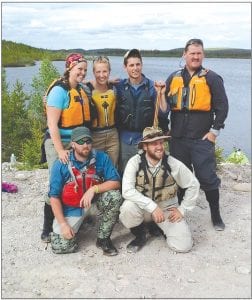With their watches packed away and civilization disappearing behind them one paddle stroke at a time, the six-person crew that left Duluth mid-June is making good progress on their way to Hudson Bay.
Almost two weeks into their two-month portage/ paddle, Adam Maxwell, Ryan Ritter, Jake Bendel, Tessa Olson, Kari Smerud, and Alex Compton have completed 179 miles of their 900-mile journey that will take them from northern Saskatchewan to the Hudson Bay Inuit community located at Whale Cove in Nunavut.
The team, which left from Duluth on June 18, drove 47 hours to Waterbury Lake in Northern Saskatchewan where they launched three canoes, is made up of several college students and recent college graduates that met at UMD or at summer camps.
Maxwell, Bendel and Olson are former employees of Voyageur Canoe Outfitters (VCO) on the end of the Gunflint Trail. Bendel and Maxwell joined with Ritter in 2012 and spent 87 days canoeing 1,800 miles from Jasper, Alberta to Hudson Bay in Churchill, Manitoba.
To get ready for this trip the crew purchased two antique Old Town Discovery canoes (17.4 ft.) from a summer camp in Wisconsin. The canoes needed a lot of patching and repair, and when the work was done they named them Innugati and Annakpok which is Inuit for friend and free.
The third canoe Voyages is a 2011 18.5-foot Wenonah Champlain that will have over 4,000 miles by the end of the trip. Because it costs about $500 each to transport the canoe back home, the crew plans on bartering, selling, or giving them away in Whale Cove.
Because the trip is so remote—they don’t expect to see anyone for a 20-day period—they can’t restock their food on the trip, so they had to pack it and carry it with them. That adds a lot of weight to carry across portages.
On June 29 the crew portaged all of their gear, food and canoes 3.1 miles as they traveled from Black Lake to Chipman River. They carried 18 backpacks, which weigh 1,500 pounds plus their canoes.
To fuel their arduous adventure they vacuum packed meal-sized servings. Each day is preplanned. On Monday breakfasts are servings of 6 cups of oatmeal, brown sugar and some raisins packed together, with a blob of peanut butter added. Tuesday and Friday they will eat pancakes with real maple syrup and Wednesday and Saturday they get to munch 6 cups of granola and powdered milk with a blob of peanut butter. According to their Facebook page, Sundays are the day, “they will jump out of their tent because it is powdered egg day.”
Other meals will consist of wild rice, granola, cheese, sunflower seeds, nuts, Snickers candy bars, summer sausage, deer jerky, oatmeal, dehydrated apples, beef jerky, trail mix and fish they catch. They packed 105 pounds of peanut butter, 12 pounds of highlander grog coffee (they use a bandana as a coffee filter), and a variety of teas, Tang, hot chocolate, and Crystal Light.
Each person had to raise $2,600 for the trip. Most of the money will be spent on transportation, with food running about $7 to $10 each per day.
Starting at Waterfound River, the crew has paddled the Fond Du Lac and Chipman rivers so far. Ahead of them are the Dubawant, Kamilukuak, Nowleye, Kazan, Ferguson and Wilson, which lead into Hudson Bay. Much of the trip is paddling rivers located in the tundra. At the finish they hope to see whales and not see polar bears, which are numerous. To protect themselves they are carrying guns, flares, and sirens to scare off the large predators. They also have Spot locators and phones to use if they need to call for help.
With strong feelings about the outdoors and educations aimed at outdoor recreation, teaching, and the environmental sciences, the crew wants to use this trip to show nature at its most rugged and wild state, said Maxwell.
“We want to educate people about wilderness and the importance of preserving it, and to inspire more young people to paddle,” said Maxwell.
Follow their progress at 8 Rivers North Expedition on Facebook.



Loading Comments